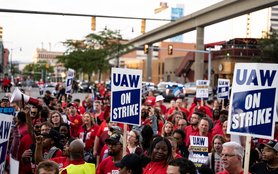In normal times, state laws matter to workers and their families. Now, state laws may be what saves families from hunger and homelessness—or not.
As we head toward Labor Day, here’s a chilling fact: Each week, about a million people file new jobless claims.
One. Million. People.
We’re so pummeled by sad news every day that this barely registers. But these numbers should sound alarm bells.
People build lives around their income. They pay rent or mortgages. Pay for power, water, internet.
When the income stops, the bills do not.
So how do working families cope with all the challenges from the pandemic—the public health crisis, and the economic catastrophe?
It’s not by turning to the federal government, which has failed at providing an adequate safety net. Rather, most people rely on resources in their own states.
Oxfam has just published an index of how states are responding to this crisis: The interactive map provides stark illustrations, and the report lays out the details.
Assessing and ranking the states in how they’re responding to COVID-19
When Oxfam was pulling together the annual Best States to Work Index (which measures how states determine compensation and conditions for workers), we were also watching the US economy head into free-fall from the impacts of COVID-19—including a historic wave of job losses. One week, millions were reporting to work at hotels and restaurants, shoe stores and movie theaters. The next, nearly all these jobs had evaporated.
We soon realized we needed to create an index for this new reality. The resulting index has three policy areas, which address challenges at work, in the community, and after job loss:
- Worker protections: Are states taking measures to protect workers and communities?
- Healthcare: Are states protecting the health of residents?
- Unemployment supports: Are states taking actions to provide a safety net for people who’ve suddenly lost income?
- COVID-era assistance on basic needs: Is there a moratorium on evictions and utilities shut off? Increased food assistance?
- COVID-era unemployment supports: Has the state expanded unemployment past CARES Act?
- Preexisting unemployment supports: Does the state offer robust benefits?
Lessons we learned about unemployment supports
It matters a lot which state you live in right now—especially if you lose a job.
Unemployment benefits are determined at the state level. Maximum benefits range from $190 a week (Puerto Rico) to $853 (Massachusetts).
Only two states offer assistance to undocumented workers (California and Washington).
Only two states mandate a rent grace period.
Only 15 states have a moratorium on evictions.
Job losses are having a disproportionate impact: Blacks, women, low-wage workers hit hardest
The economic and health crisis has struck Black Americans especially hard. They occupy many jobs in essential high-risk sectors; they’ve seen disproportionate shares of infections and deaths; and their unemployment numbers have skyrocketed. The virus is simply exposing the systemic racism built into our economy. And exacerbating it.
Unemployment rates reflect and deepen longstanding inequalities. The unemployment rate for Black people is 15 percent vs. 9 percent for white. For young Black women, it’s 27 percent.
The unemployment rate for people making under $25K is 24 percent vs. 11 percent for all income levels, and 8 percent for those making more than $75K.
Latinx and immigrant workers are bearing a huge burden. Millions are on the front lines of the food system, laboring in dangerous conditions in agricultural fields and meatpacking plants. And many have lost their jobs—in hotels and restaurants—and may not be eligible for benefits, or able to navigate the system even if they are.
A young woman Oxfam spoke to in Massachusetts jumped through hoops to apply for benefits and noted, “It’s super unclear—even for someone whose native tongue is English.”
The federal supplement is a lifeline for millions—and it’s gone
The federal CARES Act temporarily supplemented unemployment insurance with $600 per week. On July 31, that assistance ended, and the Senate has failed to pass new legislation that would step into the yawning gap.
Oxfam interviewed unemployed workers in several states, and each emphasized how crucial that supplement was in helping them cover bills.
In Massachusetts: “Had the federal benefit not been there, I would not have made rent.”
In Mississippi: “When the CARES act increased unemployment insurance, it was a game changer and lifesaver for so many.”
Puerto Rico: “I was getting the extra $600, but it ended on July 25. Not receiving the extra has been a disaster—the difference is a lot. Now, the $170 per week is not enough.”
People want to get back to work
The Senate has failed to pass the next relief package, and some opponents have fallen back on the argument that people won’t return to work if they can make more money on unemployment. This argument does not stand on many levels. It has been shown that robust benefits do not deter people from working (people want to work and earn a living), and there are few jobs to return to.
As one person in Puerto Rico noted: “Being unemployed is horrible. These are hard times; I understand that I am not the only one. These are hard times for everyone—some more than others.”



